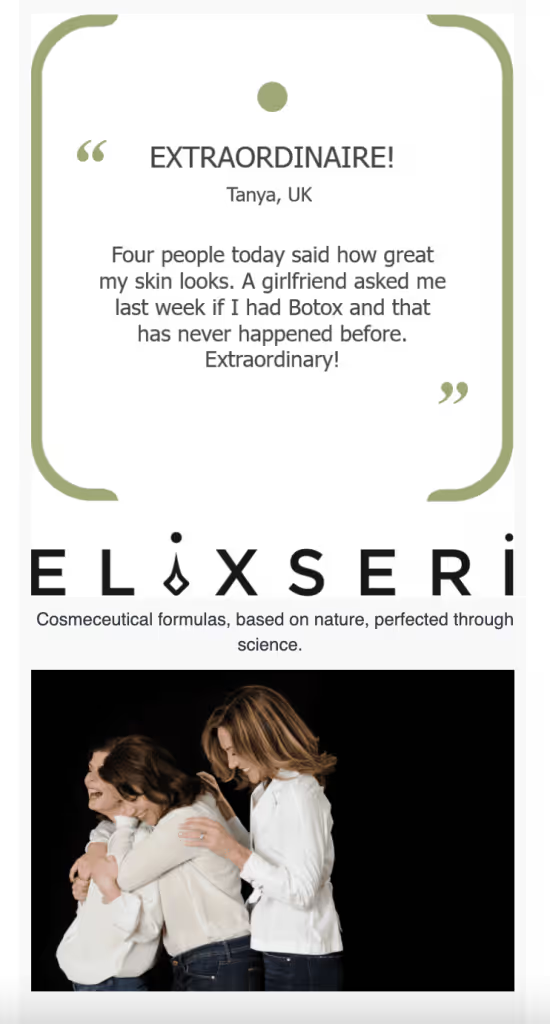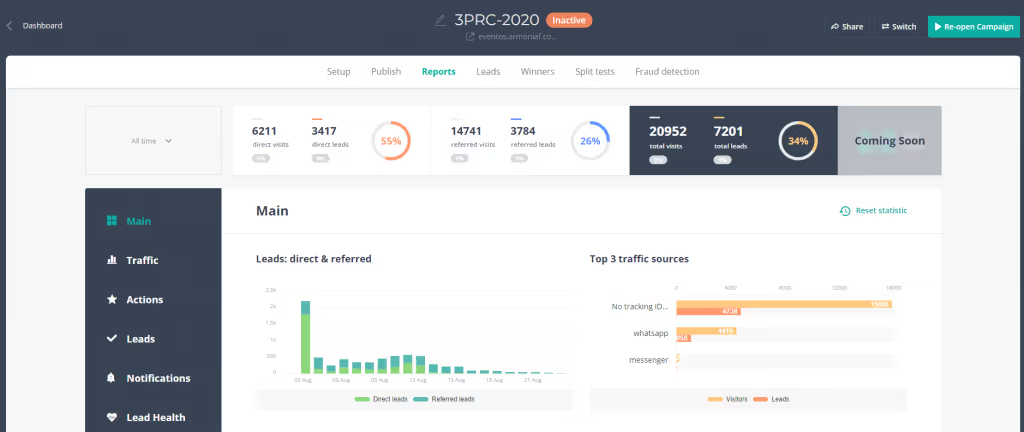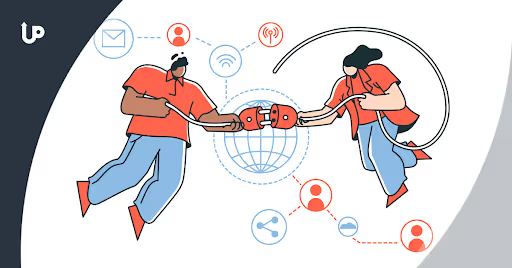Referrals are a powerful marketing tool because they tap into something we all rely on — trust. When a friend or family member recommends a product or service, we’re far more likely to pay attention and act on it than we would with a regular ad.
That’s because personal recommendations carry weight. 😉
They feel authentic and come from people whose opinions we value, making referrals one of the most effective ways to bring in new customers.
What makes referrals even more impactful is the psychology behind them. We’re naturally wired to look for social proof, especially when making decisions. This means that if someone we trust has had a great experience with a brand, we feel more confident that we’ll have a positive experience too.
This sense of assurance helps overcome doubts and nudges us toward making a purchase. It’s why referrals can turn into a growth engine for businesses since they blend trust and word-of-mouth marketing.
What Are Referrals?
Referrals are all about sharing positive experiences with others, whether it’s personal or in a business setting.
In our everyday lives, we naturally refer people to things we love — like when a friend recommends their favorite coffee shop or you tell a neighbor about a great handyman. These personal referrals feel genuine because they come from a place of trust, making them incredibly influential.

In business, referrals often take on a more structured form. Companies may set up referral programs, offering discounts or rewards to customers who bring in new clients. But even without a formal system, word-of-mouth referrals from happy customers can be a huge driver for growth.
So, what is the point of getting a referral? 🤷🏻
It’s about leveraging trust to attract new customers who are more likely to engage with your brand. Whether it’s a personal recommendation or part of a referral program, these endorsements carry weight because they’re based on real experiences, not just marketing.
There are several types of referrals, each with its own unique impact:
- Verbal Recommendations: These are the most organic and common type, where people share positive experiences with friends, family, or colleagues. It’s informal, but powerful because of the trust factor between people.
- Referral Programs: Businesses often create structured programs offering rewards, discounts, or incentives for customers who refer others. This encourages more referrals and makes it easier to track the impact on growth.
- Online Reviews and Testimonials: While not direct referrals, positive online reviews or customer testimonials can act as a form of referral. They can influence potential buyers who value other customers’ opinions.
- Influencer or Affiliate Referrals: Companies may work with influencers or affiliates who recommend their products to their audience. This type of referral leverages the trust influencers have built with their followers.
Each type helps spread the word, but the personal nature of customer referrals often makes them more impactful than traditional advertising. Customer referrals stand out from other types of promotions because they feel more genuine and trustworthy.
Unlike ads or email campaigns, which are designed by the company, referrals come from real people who’ve had positive experiences and want to share them!
The Psychology Behind Referrals
What is the psychology behind referrals?
It’s deeply rooted in human behavior and trust. As someone hears a recommendation from a friend or family member, they are likely to feel a sense of validation and confidence in the product.
The Power of Social Proof in Referrals
We look to others' experiences to inform our own decisions. Essentially, knowing that someone we trust has had a positive experience helps us feel secure in our choices.
Social proof plays a significant role in the effectiveness of referrals, as you will learn in the case study below:
Case Study Highlight:
In just 21 days, Nina Franks transformed Elixseri’s marketing strategy using UpViral, generating an impressive 3,311 leads and $4,900 in sales!
Originally planned for 6-8 weeks, the campaign wrapped up early due to overwhelming interest.
With Elixseri's fabulous skin serums as prizes and real customer testimonials on their lead capture page —like one celebrating incredible results — Nina created a buzz on social media that sparked massive engagement and shares.
See the screenshot below:

Curious about the details? Check out the full campaign structure here!
The Role of Reciprocity in Referral Behavior
Reciprocity plays a powerful role in referral behavior, tapping into our natural inclination to give back when we receive something. When someone refers to a friend or shares a positive experience, it often creates a sense of obligation to return the favor, whether through a purchase, a testimonial, or another referral.
For example, think about a friend who raves about a fantastic restaurant. You’re naturally drawn to check it out, and once you do, you can't help but share your own experience with others. This cycle not only strengthens your trust in that restaurant but also deepens your loyalty to it.
Do referrals make a difference? Absolutely!
Businesses can tap into this by offering incentives, like discounts or rewards, which encourage customers to spread the word while also satisfying their desire to give back. Cultivating these connections helps brands build a community of advocates who genuinely feel valued and are excited to support each other.
🤓Read more: Give and Get Back: 10 Best Reciprocity Examples In Marketing
How Authority and Expertise Influence Referrals
Authority and expertise can really shape how we make referrals. Imagine a well-known chef praising a kitchen gadget—you’re way more likely to listen to them, right?
That’s because their expertise makes their recommendation feel trustworthy. This happens in so many areas, like when a doctor suggests a health product or a tech guru talks about the latest gadget.
Brands can take advantage of this by collaborating with influencers or respected figures who align with their values. When these trusted voices share honest experiences, it not only builds credibility but also inspires their followers to check out the brand and spread the word.
By harnessing authority and expertise, businesses can reach more people and create a loyal community that feels good about recommending them.
Emotional Drivers Behind Sharing Positive Experiences
People are often motivated to share positive experiences because it amplifies their joy and fosters connections. When something delightful happens—like a great meal or a heartwarming event—they want others to feel that happiness too.
Sharing not only invites friends into the excitement but also validates their choices, making the experience even more meaningful.
There’s a sense of reciprocity at play: when one person shares, it encourages others to do the same, creating a supportive community.
Plus, sharing allows for self-expression, showcasing personalities and values.
Ultimately, these emotional drivers highlight that sharing isn’t just about the moment itself; it’s about connection, validation, and the joy of uplifting others.
Case Study Highlight:
Joselyn Quintero's UpViral campaign really took off because she understood the emotional needs of her audience—especially women aged 35-60. Instead of offering flashy cash prizes, she gave away a $200 course that genuinely helped people grow.
This approach resonated deeply with her audience, creating a sense of community and connection. Rather than competing for attention, she encouraged sharing and collaboration, which made everyone feel involved and valued.
By focusing on empowerment and the journey toward financial independence, Joselyn crafted a campaign that felt personal and impactful, leading to amazing results and fostering real relationships along the way.

The Halo Effect: How Referrals Enhance Perception
The Halo Effect is the phenomenon where our general impression of someone influences how we perceive their specific traits. For instance, when a friend highly recommends a product, it not only boosts our opinion of that product but also enhances the overall perception of the brand.
This positive feedback loop occurs as satisfied customers become passionate advocates, significantly improving the brand's reputation. For businesses, nurturing strong relationships with customers is crucial; when they genuinely love your offerings, they’re more likely to share their enthusiasm, which can drive growth and success.
How Can Businesses Leverage Referral Psychology?
Referral psychology is a powerful tool for businesses to grow organically. When customers share their positive experiences, brands can expand their reach, build trust, and drive engagement naturally. Let’s dive into how businesses can make the most of this strategy.
Offer incentives like discounts or gifts for referrals.
Offering incentives for referrals is a win-win for everyone. People love sharing good experiences, and when there’s a reward like a discount or a gift, it feels even better.
For businesses, it’s a way to turn happy customers into loyal advocates, spreading the word to friends and family. It’s not just about getting more customers—it's about building relationships and trust.
When someone refers a friend, that new customer is already coming in with a positive view of your brand, making them more likely to stick around.
Simplify the steps required to make a referral.
Make the referral process as simple as possible. Offer a clear and easy way for customers to share—whether it's a quick link, a button, or a pre-written message they can send. The fewer steps involved, the more likely people will actually refer their friends. Simplicity keeps things smooth and effortless, encouraging more participation.
Use data to understand what motivates your customers to refer others.
Digging into customer data helps you uncover what truly motivates them to share your business with others. Whether it's because they love your product, value rewards, or just want to spread the word, knowing what drives them can help you create more personal, effective referral programs.
When you connect with your customers’ real motivations, you'll see more referrals and build stronger relationships along the way.
Conclusion
Referrals are a powerful tool that combines trust, social proof, and positive experiences to drive business growth.
When customers feel confident in a brand, they're naturally inclined to share it with their friends, and this word-of-mouth recommendation carries more weight than any traditional ad.
Want to elevate your referral game? UpViral simplifies creating engaging campaigns that drive leads and boost sales. Turn your satisfied customers into your best advocates—start with UpViral today and watch your results soar!





.png)